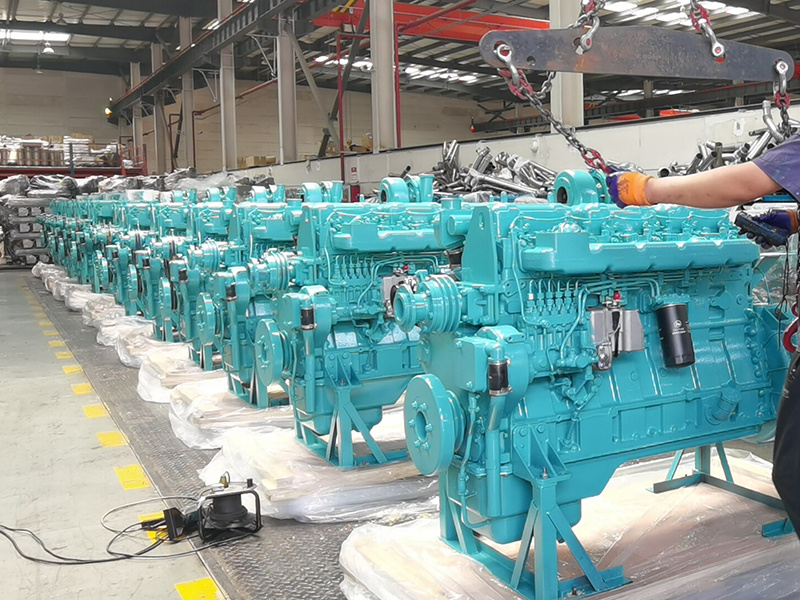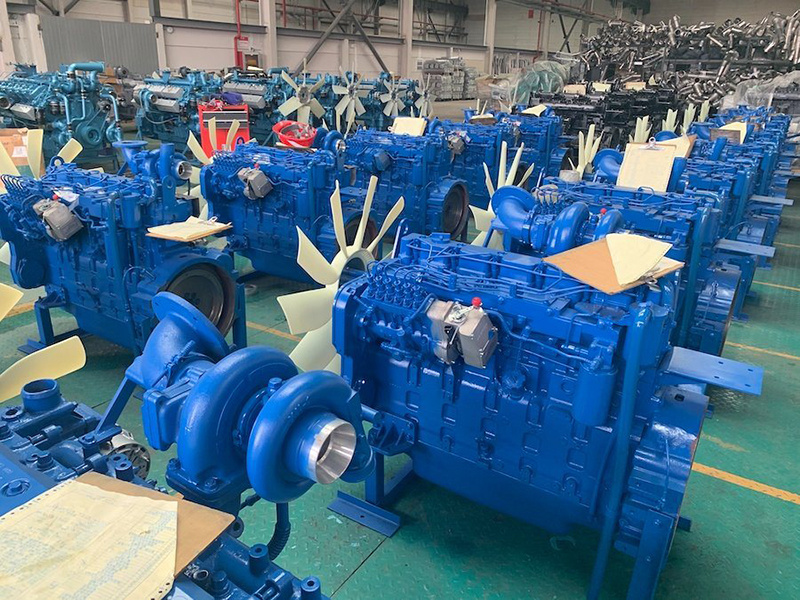News Center
2023-11-24
Making the Right Decision: Gasoline or Diesel Engine for Your Boat?
Making the Right Decision: Gasoline or Diesel Engine for Your Boat?
When it comes to choosing the most suitable marine diesel engine for your boat, there are several factors that need to be considered. One of the first decisions you will need to make is how much energy you require. In most cases, the boat builder will provide a power range for you to choose from. However, it is worth sea-trialing the boat with the various options already installed to ensure that your speed requirements can be met with the standard power package or if an optional higher horsepower setup would be a better choice.
It is important to remember that when sea-trialing a new boat, it may not have all the normal cruising gear that you would typically carry. Just like a plane without wings, the power-to-weight ratio of a boat matters. Even a difference of 25 to 50 horsepower can have a significant impact on the overall performance of the boat.
In addition to horsepower, the weight of the engine itself must also be considered as part of the overall power-to-weight ratio of the boat. This is especially important when it comes to repowering a boat. The physical size and motor mounting area need to be taken into account to ensure that the new engine will fit properly.
Service visits are another key aspect that should not be overlooked. If you decide to replace the engine with a different one, factors such as the water pump impeller, filter, and injection system bleeder screws should all be considered. These components play a crucial role in the proper functioning of the engine and can affect its performance.
When considering the most suitable marine diesel engine, it is essential to take into account both the power requirements and the physical attributes of the engine. Finding the right balance between horsepower and weight can greatly impact the overall performance of the boat. Additionally, considering factors such as service visits and compatibility with existing boat systems is crucial for a smooth transition.
In conclusion, choosing the most suitable marine diesel engine is a decision that should not be taken lightly. By considering factors such as horsepower, weight, service visits, and compatibility with existing systems, you can ensure that you select the engine that best meets your needs. Remember, a well-chosen engine can make all the difference in the performance and efficiency of your boat.
one of the crucial decisions you need to make is whether to opt for a gasoline or diesel engine. While many people are more familiar with gasoline engines, recent advancements in diesel engine technology have made them a viable alternative. In this article, we will explore the factors you should consider when deciding on a diesel engine for your boat.
Advancements in Diesel Engine Technology:
In the past, diesel engines were notorious for producing heavy smoke and pollution. However, the marine industry has undergone significant changes over the past few years, thanks in large part to the efforts of the Environmental Protection Agency (EPA). Stricter regulations demanding low-sulfur diesel and reduced exhaust emissions have paved the way for cleaner and more efficient diesel engines.
Factors to Consider:
1. Determine your energy requirements:
Before deciding on a diesel engine, it is essential to determine how much power you need. Consider the size and weight of your boat, as well as the specific activities you plan to engage in. This information will help you select the appropriate engine size and power output.
2. Conduct sea trials:
To fully understand and compare different power options, it is recommended to conduct sea trials. This hands-on approach allows you to experience firsthand the performance and efficiency of various diesel engines. It will give you a better understanding of what suits your boat's needs and your boating style.
3. Engine weight and size:
The weight and size of the engine can significantly impact your boat's stability and maneuverability. It is crucial to choose an engine that is compatible with your boat's design and weight capacity. Additionally, ensure that the engine's weight distribution aligns with your boat's structure for optimal performance.
4. Access to service points:
When investing in a diesel engine, it is vital to consider the availability of service points. Be sure to choose a brand that offers convenient access to professional service and spare parts. This is especially important if you plan to cruise in remote or unfamiliar waters, where reliable service support may be limited.
5. Choose reputable brands:
Selecting a trusted brand for your diesel engine is crucial for overall reliability and performance. Opt for brands that have a strong reputation for manufacturing durable engines and provide exceptional customer support. Having access to professional service and genuine parts will ensure smooth sailing and minimize the chances of unexpected breakdowns.
Conclusion:
Choosing between gasoline and diesel engines for your boat requires careful consideration of various factors. While diesel engines have come a long way in terms of efficiency and environmental friendliness, it is essential to assess your specific requirements, conduct sea trials, and consider the weight, size, and maintenance support of the engine. By making an informed decision and selecting a reputable brand, you can enjoy the benefits of a reliable and efficient diesel engine for your boating adventures.
Marine diesel engines are undergoing a significant shift as more and more engines are being equipped with computer-controlled "common rail" technology. This change is primarily driven by the EPA's Tier-3 emissions requirements, which aim to reduce pollution from diesel engines in various industries, including marine transportation. Starting in 2016, Tier 3 standards have been imposed on nearly all recreational diesel-powered boats, irrespective of their size or engine horsepower.
For new engine owners, these regulations have brought about several implications. The most noticeable changes have been in terms of maintenance, troubleshooting, and the limitations they impose on do-it-yourself tasks. Previously, owners could easily perform routine oil and fuel filter changes, cooling system maintenance, or water pump impeller replacements. However, with the introduction of common rail engines, special tools and engine training are now required for any job beyond these basic tasks.
One of the key differences between engines with older mechanical fuel injection systems and the latest high-pressure diesel engines lies in air injection systems. Bleeding air from older engines was a relatively simple task that could be undertaken by a skilled boat owner. However, attempting the same on the latest common rail engines is not only impossible but also potentially dangerous. These new engines, similar to those found in cars and trucks, now rely on electronic diagnostic scanners to troubleshoot any running problems that may arise.
For long-range cruisers who rely on their boats for extended periods of time, the introduction of common rail engines presents a unique challenge. Finding a qualified engine technician in remote locations, such as Fiji, can be problematic. Maintaining and repairing these engines requires specialized knowledge and access to electronic diagnostic tools, which may not be readily available in some parts of the world.
While these new regulations and advancements in engine technology are undoubtedly beneficial for the environment, they do bring about certain challenges for boat owners. The reliance on specialized tools and technicians can be costly and may limit the ability of owners to undertake maintenance and repairs on their own. As marine diesel engines continue to evolve, it will be important for owners to stay informed about the latest advancements and to ensure they have access to the necessary resources for ongoing maintenance and troubleshooting.
What happens to your engine and possibly your engine control system after a lightning strike is another good question. The electronics on the plane will most likely be destroyed, and you won't have an engine until a qualified technician can inspect and replace the burned out electronics. Therefore, a circumnavigating sailor or trawler owner may wish to carry spare parts. If you're considering a long-distance cruise to a remote location, having access to a global network of qualified dealers should be a major consideration.
With these ideas in mind, let's take a look at what's available on the market today when it comes to new diesel engines.
When it comes to navigation auxiliary power for sailboats, one brand that stands out is Dongfeng. It has gained a significant lead in the sailboat industry. However, determining which brand is better is subjective, as each brand has its supporters and detractors. It is wise to consider factors like the dealer network, availability of parts, and service when evaluating these engines.
Over the past 15 years, companies have made significant investments in developing their dealer networks. These networks now play a major role in providing support and after-sales service for new sailboats. Sailors and trawler owners can benefit greatly from a well-connected dealer network, especially when cruising in remote locations.
When it comes to engine and engine control systems, one major concern is the impact of a lightning strike. Lightning strikes can significantly damage the electronics of an engine, rendering it useless until repaired by a qualified technician. It becomes crucial for sailors and trawler owners to be prepared for such scenarios by carrying necessary spare parts.
For those planning a long-distance cruise to remote locations, having access to a global network of qualified dealers becomes paramount. This ensures that assistance, parts, and service are readily available when needed. By evaluating the dealer network of a brand, sailors can make informed decisions about which engine to choose for their sailboats or trawlers.
Dongfeng, being a popular brand in the sailboat industry, has a well-established dealer network. The brand has invested heavily in developing its network, which allows them to provide exceptional support to customers all around the world. Sailors and trawler owners considering Dongfeng engines can benefit from the peace of mind knowing that help is just a call away, even in remote locations.
In conclusion, when it comes to new diesel engines for sailboats or trawlers, considering factors such as the dealer network, parts availability, and service becomes crucial. Dongfeng emerges as a leading brand in the market, with its well-established dealer network. As sailors plan their long-distance cruises, having access to a global network of qualified dealers should be given due importance. By carefully evaluating these factors, sailors can choose the best engine to ensure a smooth and hassle-free sailing experience.


CONTACT US
Shangyan Power Technology Jiangsu Co., Ltd
Shangyan Jiangsu Import & Export Co.,Ltd
 inquiry@sypower.com
inquiry@sypower.com
 +86-21-59946018
+86-21-59946018
 https://www.sypower.com/
https://www.sypower.com/
 9 Jinggangshan Road, Suxitong Science and Technology Industrial Park, Nantong City, Jiangsu Province
9 Jinggangshan Road, Suxitong Science and Technology Industrial Park, Nantong City, Jiangsu Province
Copyright © 2022 SHANGYAN POWER All Rights Reserved. Powered by:www.300.cn SEO


 Language
Language 







 sales.cn@renesola-energy.com
sales.cn@renesola-energy.com 

 Message
Message 